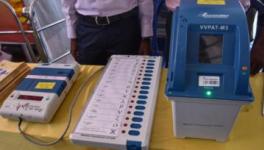SC Order on Prabir’s Release Defends Principles of Natural Justice, Independent Journalism

Prabir Purkayastha, after SC ordered his release holding his arrest as illegal.
The order of the Supreme Court declaring the arrest of Prabir Purkayastha, founder and editor-in-chief of NewsClick, as illegal and void and releasing him on bail is indeed momentous for the cause of the principles of natural justice and in defence of independent journalism. His illegal arrest by the Narendra Modi regime on October 3 last year, without following the laid down due procedure, among others, under the draconian provisions of the Unlawful Activities (Prevention) Act (UAPA) had sent shock waves in the journalistic fraternity. An editor of his stature facing charges of terrorism and other dreadful allegations that he acted against the sovereignty and integrity of India had outraged the media world.
Violation of Constitution and Natural Justice
It is a travesty of the Constitution that the day Purkayastha was arrested and remanded to police custody for seven days, neither he nor his lawyers were furnished with the grounds of his detention and police remand. It is now becoming clear that all those coercive actions were taken against him with an intent to “teach him a lesson” for upholding the cause of independent journalism and culture of dissent, which Newsclick represents in face of such intimidation. The unilateral and arbitrary action to arrest Purkayastha and remand him to police custody infringed his right to life and liberty.
The principles of natural justice mandate that a person facing action of the State with serious bearings on her/his freedom, should be informed about the grounds on which such action was taken. In this case, Purkayastha and his lawyers were kept in dark about his incarceration and the stringent charges he was slapped with.
He did not even get a copy of the FIR concerning the case for several days, and only after the orders of the court, did he and his lawyers obtain it.
The action of the State authorities to keep the grounds of arrest suppressed from Purkayastha and his lawyers violated Article 22(1) of the Constitution, which states : “No person who is arrested shall be detained in custody without being informed, as soon as may be, of the grounds for such arrest nor shall he be denied the right to consult, and to be defended by, a legal practitioner of his choice.”
Violation of SC Order
It is noteworthy that on October 3, 2023 Prabir was arrested and remanded to police custody and simultaneously police raids were conducted at the houses of more than a hundred people, some of whom worked for Newsclick and others who contributed articles and videos to it.
The same day, the Supreme Court, in Pankaj Bansal versus Union of India, held that, “…to give true meaning and purpose to the constitutional and the statutory mandate of Section 19(1) of the Act of 2002 of informing the arrested person of the grounds of arrest, we hold that it would be necessary, henceforth, that a copy of such written grounds of arrest is furnished to the arrested person as a matter of course and without exception”. A plain reading of the verdict makes it clear that without communicating the grounds of arrest, the aforementioned constitutional mandate was violated with impunity in the case of Purkayastha’s arrest.
It is well established by the constitutional provisions that the orders passed by the Supreme Court constitute the law of the land. By not furnishing the grounds of arrest to Purkayastha, the law of the land, as established by the SC in the Pankaj Bansal versus Union of India case, was breached.
The SC Order
In its order releasing Prabir Purkayastha, the Supreme Court said, “From the detailed analysis made…there is no hesitation in the mind of the court to reach to a conclusion that the copy of the remand application in the purported exercise of the communication of the grounds of arrest in writing was not provided to the accused appellant or his counsel before the passing the order of remand dated October 4, 2023, which vitiates the arrest and subsequent remand, of the appellant.”
The legal points raised by the SC in its order for releasing Purkayastha on bail glaringly brought out the flagrant violations of the principles of natural justice and the mandatory procedure required to be followed for arresting and remanding any person. In other words, his arrest and detention and his subsequent remand was devoid of any reason prescribed by the Constitution and orders of the apex court of the country.
Therefore, his release constitutes a huge affirmation of his personal liberty and that of independent journalism, which has been trampled upon by the manifold measures taken by the Narendra Modi regime.
Replay of Muzzling of Press by British Rulers in Punjab
As one reflects with a sense of happiness and hope after the release of Purkayastha, one is reminded of the Punjab situation during British rule in 1919 when the Jalianawala Bagh massacre took place. During that period, the press was muzzled by prosecuting editors of several newspapers and sentencing them to imprisonment. In my Newsclick article of October 12, 2023, “Punitive Action Against Newsclick Echoes Muzzling of Press in Punjab in 1919,” there is a reference to the “Congress Report on the Punjab Disorders” authored by Mahatma Gandhi. He observed, therein, that there was suppression of public opinion by gagging the local press and shutting out nationalist newspapers from outside the Punjab. In that context, he referred to the arrest of the trustee of The Tribune newspaper, Manohar Lal, at 7.30 a.m. on April 18, 1919, without showing him any warrant or informing him of the grounds on which he was detained. In Purkayashta’s arrest in 2023, those aspects of arbitrary arrest were being played out.
Gandhi also referred to the imprisonment of Kalinath Roy, the editor of The Tribune, for his so-called seditious writings and the prosecution of the editor of Pratap. He then stated with anguish that, “The existence of independent journalism became an impossibility during the Martial Law regime and The Tribune, the Punjabee, and the Pratap stopped publishing”.
Independent journalism that went through trials and travails in India of 1919, is now being subjected to all kinds of punitive measures by the Modi regime. The arrest of several journalists and raids conducted in the offices of several newspapers and independent digital platforms, such as The Wire and Newsclick, remind one of the colonial era of brutal action to supress voices of dissent.
Protecting Freedom of Press, the Foundation of Swaraj
Purkayastha’s arrest is an example of that ominous trend and his release on the orders of Supreme Court give much needed hope that trend will be reversed, and uphold the cause of independent journalism and freedom of press, described by Mahatma Gandhi in 1941 as the ‘foundation of Swaraj’ and his fervent appeal to protect that foundation with all the might.
The writer served as Officer on Special Duty to President of India K R Narayanan. The views are personal.
Get the latest reports & analysis with people's perspective on Protests, movements & deep analytical videos, discussions of the current affairs in your Telegram app. Subscribe to NewsClick's Telegram channel & get Real-Time updates on stories, as they get published on our website.






















